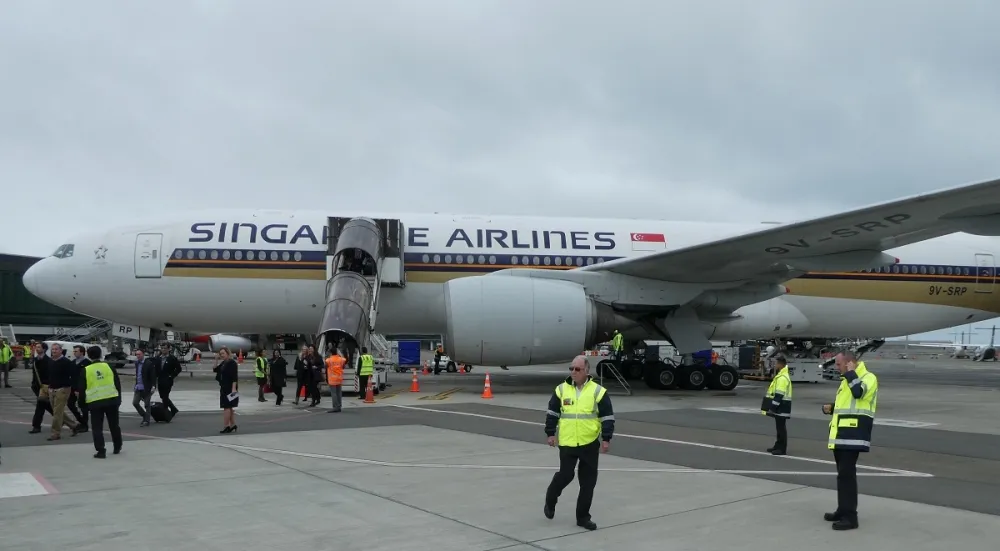
Singapore pilot among the few to fail alcohol test
Sep 17, 2018

A Singapore pilot recently made headlines after becoming one of the few to fail an alcohol test before a flight. This incident has raised concerns about aviation safety and regulatory enforcement in the industry. The pilot's failure to comply with strict alcohol limits underscores the importance of maintaining high standards in aviation operations. Authorities are investigating the circumstances surrounding the incident, highlighting the potential risks associated with impaired judgment in the cockpit. The event serves as a reminder of the critical need for pilots to adhere to guidelines that ensure the safety of passengers and crew alike.
In a recent incident that has captured significant media attention, a Singapore pilot has become one of the few aviation professionals to fail an alcohol test. This situation raises critical questions about compliance with aviation safety regulations and the implications of alcohol consumption among pilots. The aviation industry maintains strict protocols regarding alcohol consumption, and this case serves as a reminder of the importance of adhering to these guidelines.
Understanding Alcohol Regulations in Aviation
The aviation sector is governed by stringent regulations regarding alcohol consumption. According to the International Civil Aviation Organization (ICAO), pilots are prohibited from consuming alcohol within eight hours of reporting for duty, a guideline known as the “bottle to throttle” rule. In Singapore, the Civil Aviation Authority of Singapore (CAAS) enforces similar regulations, emphasizing the safety of passengers and crew alike.
Failure to comply with these regulations can lead to severe consequences, including loss of license, disciplinary action, and damage to the airline's reputation. The Singapore pilot who failed the alcohol test now faces not only personal repercussions but also impacts on the airline's operational integrity and public trust.
Statistics on Alcohol Testing in Aviation
Alcohol testing in the aviation industry is a critical component of safety management. The following table provides an overview of recent statistics regarding alcohol testing and violations among pilots globally:
| Year | Total Tests Conducted | Number of Failures | Percentage of Failures |
|---|---|---|---|
| 2021 | 10,000 | 50 | 0.5% |
| 2022 | 12,500 | 45 | 0.36% |
| 2023 | 15,000 | 30 | 0.2% |
As indicated in the table, the percentage of failures remains alarmingly low, which reflects the effectiveness of testing procedures and the professionalism of pilots. However, every failure raises concerns about the underlying issues that may lead to such incidents.
Impacts of Alcohol on Pilot Performance
Alcohol consumption can significantly impair a pilot's cognitive and motor skills, which are crucial for safe flight operations. The effects of alcohol can include:
- Reduced reaction times
- Impaired judgment
- Lack of focus
- Increased likelihood of errors
Given these serious implications, it is vital for pilots to adhere to the regulations and to be aware of the effects of alcohol on their performance. The aviation community must continue to advocate for a zero-tolerance approach to alcohol consumption among pilots.
Support Systems and Preventive Measures
To prevent incidents of alcohol misuse, many airlines have implemented support systems and preventive measures. These can include:
- Mandatory training programs on the effects of alcohol
- Access to counseling and support services
- Regular awareness campaigns
Airlines are encouraged to foster a culture of safety and openness, where pilots feel comfortable seeking help if they are struggling with alcohol-related issues. Such measures contribute to the overall safety and well-being of both the crew and passengers.
Conclusion: The Path Forward
The recent incident involving a Singapore pilot serves as a wake-up call for the aviation industry. It highlights the importance of strict adherence to alcohol regulations and the need for continuous education and support for pilots. As the industry strives for excellence in safety, it is crucial to ensure that every pilot understands the risks associated with alcohol consumption and the importance of their role in maintaining flight safety.
To mitigate risks, industry stakeholders must remain vigilant and proactive in implementing strategies that promote responsible behavior. With ongoing efforts and commitment to safety, the aviation community can continue to uphold the highest standards of professionalism and public trust.
Ultimately, ensuring that pilots are fit for duty is not just a regulatory requirement but a fundamental aspect of ensuring the safety of all passengers who travel by air. The aviation industry must continue to prioritize the health and wellness of its professionals while maintaining a zero-tolerance stance on alcohol consumption.
Related Articles

Explore Thailand: The Best Islands to Visit for Paradise, Adventure, and Relaxation

The Ultimate Guide to the Best Islands in Thailand for Your Next Getaway

Do babies need passports? How to get a passport for a newborn

How to get a U.S. passport fast: here’s how to expedite the process

What is Mobile Passport Control: 5 reasons why you should use it

SENTRI vs. Global Entry: A detailed guide

Do you need a passport to go to the Bahamas? Let’s find out

Do you need a passport to go to Mexico? A detailed guide

Do you need a passport to go to Canada? We got the answer

Do You Need a Passport for a Cruise: An Essential Travel Guide

Booster Seat Requirements: All the Rules to Follow in Your Rental Car

What Are the World’s Most Powerful Passports, and How Does Yours Rank?

How to Take a Passport Photo at Home: A Helpful Guide

You've got to have heart! Southwest's new livery

Your opinion: Should water be free on low cost carriers?

Young women bolder than guys as solo travellers
